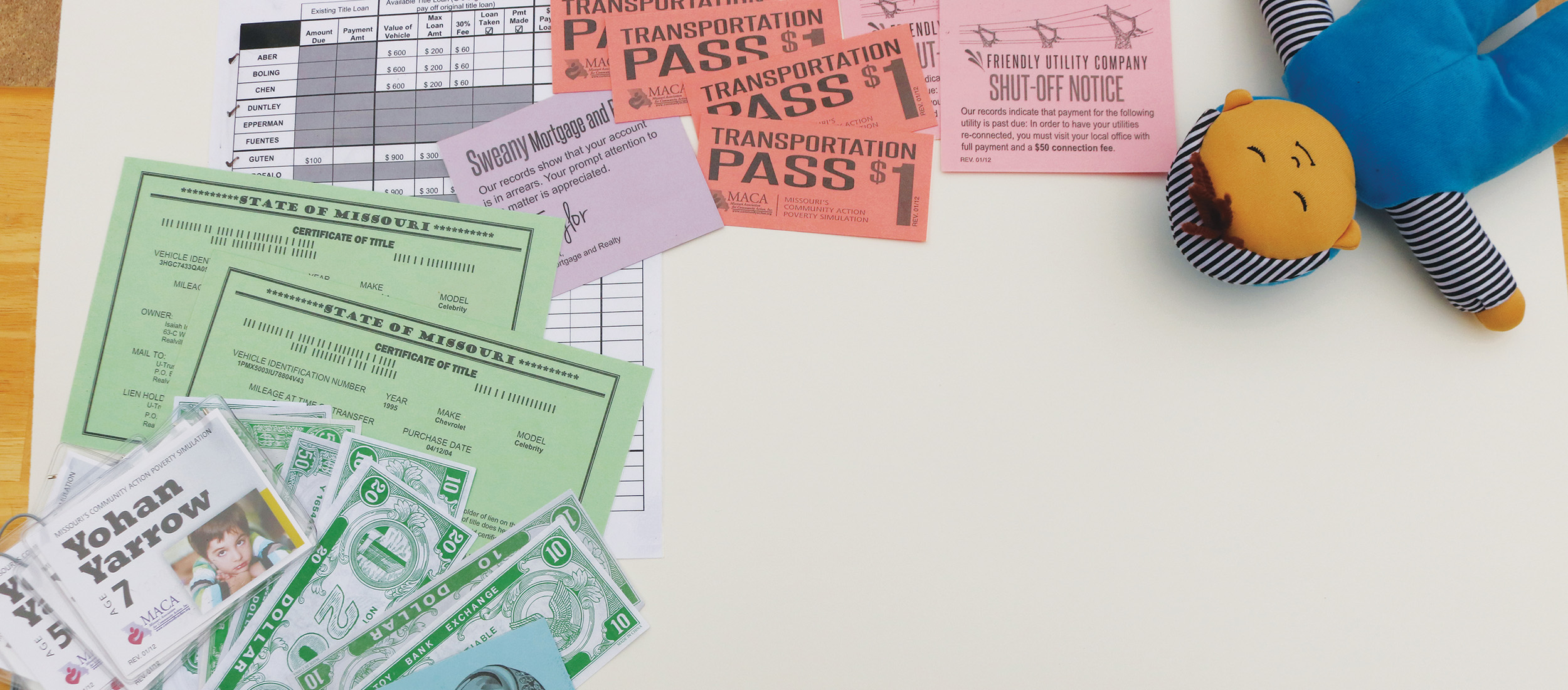
The Hour That Will Change Your Life
Monday, January 9, 2023
Media Contact: Kaitlyn Weldon | Digital Communications Specialist | 405-744-7063 | kaitlyn.weldon@okstate.edu
Imagine yourself a recently unemployed parent of two with student and car loans to pay and no health insurance. Your unemployment compensation has run out, and you cannot find a job. You had no choice but to spend the maximum amount allowed on your credit card, and you don’t know how you will afford groceries this month.
This situation is real for more than one in seven Oklahomans. For them, poverty is a reality and difficult decisions are part of daily life, said Sonya McDaniel, Pottawatomie County family and consumer sciences educator.
The rest of the state has little idea what they face, she added.
Poverty simulations, offered by a team of trained Oklahoma State University Extension family and consumer sciences educators, help to raise awareness and challenge false perceptions of individuals living below the poverty level.
“Most people who come to the simulations work with those living in poverty,” McDaniel said. “Many leave the simulation with a much deeper understanding of how to empathize and serve their communities well.
“The poverty simulation puts them in an environment where they’re truly walking the walk of their peers,” McDaniel added. “Participants are in a position where they must make decisions based on a limited income and very few resources.”
Upon arrival for the simulation, attendees are assigned a role within a family, such as a mother or grandfather. They gather in mock homes, which are represented by clusters of chairs in the middle of the room, to plan how to pay bills on time, balance work and family, and budget for food.
Volunteers set up various businesses and agencies represented at booths for attendees to visit throughout the simulation experience.
These businesses include a grocery store from which attendees buy food as well as an interfaith service center and acommunity action agency where attendees may apply for assistance.
In the simulation, family members face unexpected challenges like school closures and illnesses that quickly change the family’s status or ability to survive.
During the four 15-minute-long “weeks,” attendees make decisions to survive the “month.” A “mom” may have to carry a baby doll around to represent a small child because she cannot afford childcare, or a “grandfather” may need to sell his refrigerator for extra cash to help cover medical expenses.
Joyce Pool, outreach coordinator for Birthright Stillwater, attended a simulation as a participant where she was assigned a role she sees often at her job serving women facing unplanned pregnancies.
“I see a lot of young, first-time parents trying their best to make it on their own, but they still often end up in an unfortunate situation where they have to choose between groceries and keeping the lights on,” Pool said.
Pool grew up in poverty and was impressed with how well the simulation demonstrated how fast small complications can affect a family.
“We came back to our ‘home’ at one point to our chairs being overturned — meaning we forgot to pay an important bill or we were robbed,” Pool said. “There was even someone roaming around discreetly as ‘criminal activity’ that would randomly select different families to affect.”
“My job requires me to help people with needs such as diapers, clothing, and small baby essentials, and I may have to find clients resources beyond what we can provide them through Birthright,” Pool said. “I found that the simulation renewed my compassion toward certain situations.
“It’s truly hard for individuals to remove themselves from a generational cycle of poverty,” she added.
During the same simulation, Noah Drew, an elementary education sophomore, served as a “grocery store clerk” and learned how poverty can affect individuals over time.
“Participants initially came up, dignified, saying they wanted $100 worth of groceries because they felt empowered to make that choice, but by the end I heard their desperation,” Drew said. “They seemed stretched thin. They knew if they didn’t get $100 worth of groceries they were simply not eating.”
After three “weeks,” attendees who failed to pay rent were evicted. At this point in the simulation, a hopelessness hung in the room, Drew said.
“One of the cool things about the poverty simulation is seeing how easily someone can be in poverty,” he added. “One second, they’re fine. They’ve got a house, a job and a family — then disaster starts.
“The simulation opens your eyes that this could happen to anybody,” Drew said. “It doesn’t in any way remove your dignity or make you somehow less human.”
Drew’s time at the poverty simulation provided him with a deeper understanding of how he can better help people. Outside of the simulation, he serves with a group of students from his church on Fridays by walking the streets of downtown Tulsa and spending time with those experiencing homelessness.
“So often, individuals without homes don’t get treated like people,” Drew said. “When I say I’m trying to understand them, it’s not like I’m getting into the head of some other creature, thinking that they’re somehow removed from me. They’re still people just like we are.”
Jan Maples, Okfuskee County family and consumer sciences educator, said following the simulation, facilitators host a debrief for attendees and volunteers to share what they have learned or noticed.
The attendees gain vital perspectives for ways they could serve their communities, she added.
“I would like more people to go through the simulation so they can understand others’ feelings and actions better,” Maples said.
Individuals, businesses, agencies or organizations interested in hosting a simulation can contact their respective OSU Extension offices to assemble a facilitation team for their area.
“We have to continually remind the participants this is not a game,” she said. “This is what people have to go through just to get from day to day and month to month.”
Story By: Hannah Kay Kirby | Cowboy Journal
